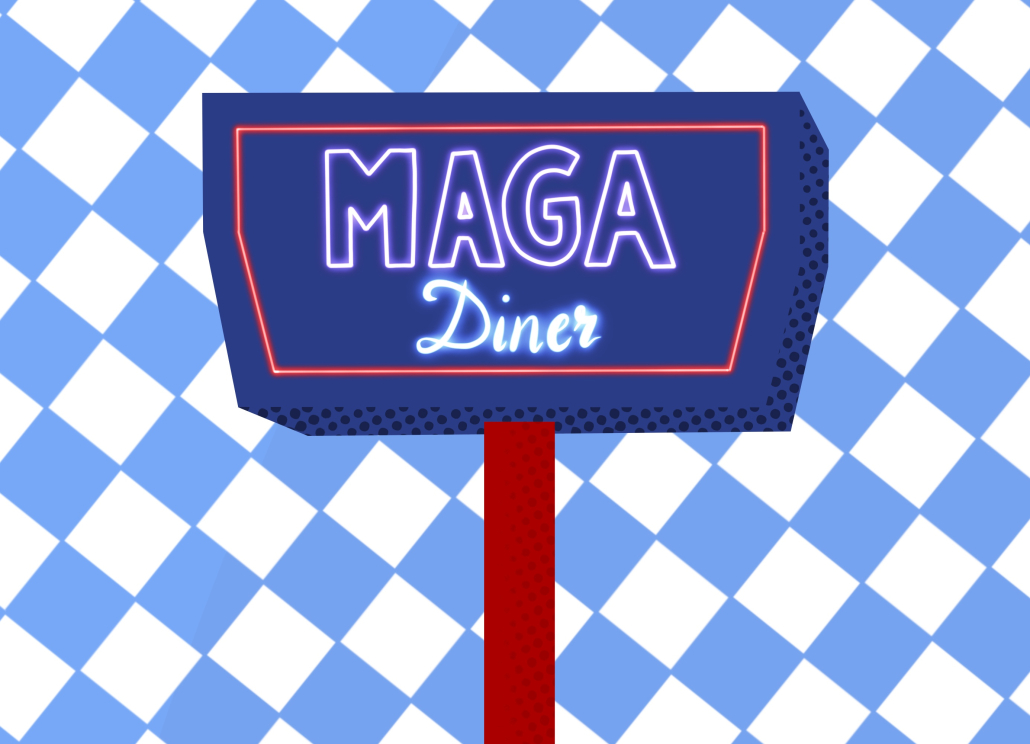Good Taste: Order up! Burgers served with a side of oppression
The sound of burgers sizzling on the grill, the smell of coffee, the sight of a milkshake with two straws. Even for those of us born half a century after the 1950s, it isn’t hard to imagine the sounds, smells and sights of the classic ‘50s diner. Although the ‘50s are long gone, the decade’s diner remains an American dining centerpiece.
Not only have the original ‘50s diners remained functional, but chains such as Johnny Rockets also keep the era alive by opening new diners with that same vintage feel. The fast-food franchise opened its first location in 1986 and has since opened several locations throughout Southern California. With its neon color palette, tableside jukebox machines and ‘50s-style employee uniforms, Johnny Rockets has tapped into our American nostalgia.
Known for greasy food and flashy colors, the ‘50s-style American diner is a relic of the past brought into the present. For many privileged Americans, diners are places full of nostalgia, reminders of an era before modern technology and social media. In a world without time machines, diners offer customers an easy journey into the past, so they can spend at least a few hours remembering life before you could search any song on Spotify.
While some Americans may relish reliving the past, most do not have the same luxury. For many communities, the ‘50s were a decade marked by violence and oppression.
In 1955, Emmett Till’s lynching dominated national headlines after several white men attacked and murdered him for supposedly hitting on a white woman. Although media outlets widely publicized Till’s murder, racially motivated attacks on Black men and women were common throughout the ’50s. According to the Equal Justice Initiative, at least 24 men and women were killed due to such attacks between 1950 and 1959.
Diners do not only immortalize a decade of oppression, but they also represent a segregated past that perpetuated violence against marginalized communities. Diners segregated their patrons and did not allow Black customers to sit at the lunch counter. To protest this segregation, four Black college students staged a sit-in at the lunch counter in a Woolworth’s diner on Feb. 1, 1960.
The Woolworth sit-in sparked similar protests throughout the country, which spread to over 55 cities. These sit-ins, along with the many protests during the ‘60s, incentivized Congress to pass the Civil Rights Act of 1964 which desegregated public facilities, including diners.
Although the protests were successful, we cannot deny the beloved ‘50s diners represent a decade of turmoil. By ignoring their history and focusing on nostalgia, diners immortalize the past while repackaging a decade of violence as a fond memory.
Nostalgia is a dish best served with a side of privilege, which allows many Americans to look at the past and recognize the plight of marginalized communities. The coupling of privilege and nostalgia gave rise to former President Donald Trump’s well-known campaign slogan, “Make America Great Again.” This phrase implies America was great in the past, a bygone era to which Trump supporters wish would return.
For instance, in a video by “The Daily Show,” several correspondents attend a Trump rally and ask the attendees when they considered America to be “great.” Every one of the Trump supporters references a time in the past, from the day the country was founded to just after World War II. In response, the correspondent points out the different communities’ oppression at the time, from non-men’s disenfranchisement to slavery and segregation.
Although this oppression makes the past unbearable for many marginalized communities, these Trump supporters can look back with rose-colored glasses because of their privilege. Just like the ‘50s diners, Trump supporters keep a sunshine-and-rainbows version of the past alive in their minds. If they’re never forced to grapple with marginalized communities’ plights, they will never support progress over regress.
I love a grilled cheese with fries and a milkshake as much as the next person, so I would never argue that every diner should close its doors. However, it is possible to keep a cuisine alive without burying the evidence of our country’s sordid past. Rather than building diners that memorialize the ‘50s, we need to create accurate representations of the past that contextualize the era.
We are responsible for learning our history, both the good and the bad, and we can not repeat the mistakes of the past. Constant callbacks to the past, such as the ever-popular ‘50s diner, only hinder that progress. Nostalgia may seem innocuous, but marginalized communities continue to pay the price for our inability to look towards a better, brighter future.
Reena Somani is a senior writing about food and its social implications. Her column, “Good Taste,” runs every other Thursday.


